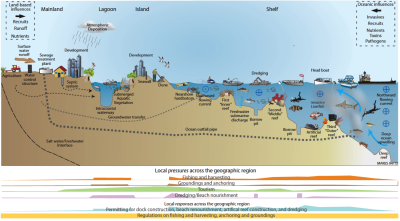Marine and Estuarine Goal Setting for South Florida (MARES): A Testbed for Science-to-Ecosystem Based Management
The coastal marine ecosystem is invaluable to the growth, development and sustainability
of South Florida. The underlying purpose of MARES is to focus and prioritize future research
and to facilitate integrated adaptive management of South Florida's coastal marine ecosystem.
MARES supports this purpose by developing a science-based consensus about the defining
characteristics and fundamental regulating processes of a South Florida coastal marine
ecosystem that is both sustainable and capable of providing the diverse ecosystem services
upon which our society depends.
MARES represents a collaboration among academic scientists, federal and state agency experts,
and non-governmental organizations working in close conjunction with federal and state
environmental managers, private industry stakeholders and interested members of the public.
The first step in the formal MARES process is to convene the relevant experts from natural
system and human dimensions science, stakeholders, and agency representatives and charge them
with developing a visual representation of their shared understanding of the characteristics
and processes regulating and shaping each sub-regional ecosystem. The second step is to build
upon these diagrams to develop Integrated Conceptual Ecosystem Models (ICEMs) using an innovative
model framework that incorporates information about the effects that people have on the environment
and about the values that motivate their actions. The objective is to organize information about
 the relationship between people and the environment in a format that will help managers deal with
the trade-offs they face by using Attributes that People Care About to focus attention upon
"Who cares?" and "What do they benefit or lose from changes in their environment?"
MARES models serve not only as a basis for synthesizing information but also for identifying societal and
ecological indicators and knowledge gaps. The third step in the MARES process is to combine these
indicators into a set of indices that can be incorporated into coastal ecosystem report cards that
document trajectories towards (or away) from a sustainable and satisfactory condition.
the relationship between people and the environment in a format that will help managers deal with
the trade-offs they face by using Attributes that People Care About to focus attention upon
"Who cares?" and "What do they benefit or lose from changes in their environment?"
MARES models serve not only as a basis for synthesizing information but also for identifying societal and
ecological indicators and knowledge gaps. The third step in the MARES process is to combine these
indicators into a set of indices that can be incorporated into coastal ecosystem report cards that
document trajectories towards (or away) from a sustainable and satisfactory condition.
To view reports from the Marine
and Estuarine Goal Setting for South Florida (MARES) Project, click here.
|
Contact Information for OCED/EAM Marine and Estuarine Goal Setting for South Florida Researchers:
 the relationship between people and the environment in a format that will help managers deal with
the trade-offs they face by using Attributes that People Care About to focus attention upon
"Who cares?" and "What do they benefit or lose from changes in their environment?"
MARES models serve not only as a basis for synthesizing information but also for identifying societal and
ecological indicators and knowledge gaps. The third step in the MARES process is to combine these
indicators into a set of indices that can be incorporated into coastal ecosystem report cards that
document trajectories towards (or away) from a sustainable and satisfactory condition.
the relationship between people and the environment in a format that will help managers deal with
the trade-offs they face by using Attributes that People Care About to focus attention upon
"Who cares?" and "What do they benefit or lose from changes in their environment?"
MARES models serve not only as a basis for synthesizing information but also for identifying societal and
ecological indicators and knowledge gaps. The third step in the MARES process is to combine these
indicators into a set of indices that can be incorporated into coastal ecosystem report cards that
document trajectories towards (or away) from a sustainable and satisfactory condition.